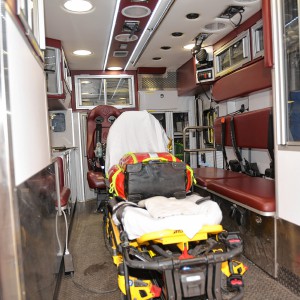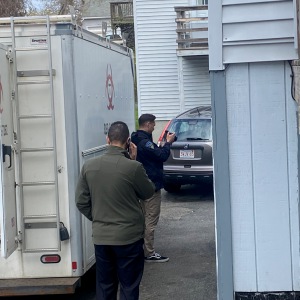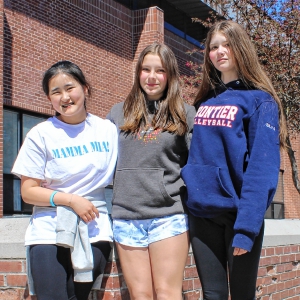Greenfield partners with local charities for textile recycling
| Published: 05-11-2022 7:24 PM |
GREENFIELD — Thanks to a new partnership, area residents will have a place to dispose of unwanted textiles, while also benefiting a local charity and reducing the amount of waste in the region.
“I think it’s a win-win-win for everyone here in Franklin County,” said Ericka Almeida, development director for Big Brothers Big Sisters of Franklin County.
In collaboration with the Greenfield Department of Public Works and Big Brothers Big Sisters, the Hartsprings Foundation — which was founded specifically for the purpose of supporting Big Brothers Big Sisters agencies — will collect used cloth on the second and fourth Saturdays of each month from 9 a.m. to 1 p.m. at the Chapman/Davis municipal parking lot. The foundation will then weigh the items to be sold off to the Savers Co., with proceeds benefiting Big Brothers Big Sisters of Franklin County.
“There’s always going to be clothes to recycle,” Almeida said. “It’s an incredible way to reduce the waste you have, recycle what can be recycled and support a youth-serving program right here in Franklin County.”
Textiles can include cloth, shoes, handbags, bedding, curtains, towels and other linen, she noted.
Almeida said Big Brothers Big Sisters was looking for ways to increase the amount of donations it was receiving, and also help the town where its employees live and work. When she read the Massachusetts Solid Waste Master Plan, which seeks to remove 100% of textiles from the city’s waste stream by 2030, she reached out to the city in search of a collection site.
“We reduce our impact on the environment, and we impact the amount of money we get because there is less fuel and resources being used,” she said. “We figure we’re going to probably pull somewhere in the neighborhood of 7,500 and 10,000 pounds of cloth per month out of the waste stream for the county, specifically Greenfield, every month.”
Like Almeida, Department of Public Works Director Marlo Warner II called the partnership with Big Brothers Big Sisters a “win-win.”
Article continues after...
Yesterday's Most Read Articles
“Textiles is a thing folks don’t have a place for, so I think this will be a good recycling program,” he said. “Right now … people are putting it in a waste bag.”
Nationwide, textiles make up nearly 6% of all municipal solid waste. In Greenfield, that’s an estimated 214 tons annually, according to a city press release.
“This effort benefits a great cause and diverts items from the city’s waste stream at a time when disposal costs are soaring,” Warner said. “This is a terrific way to help Big Brothers Big Sisters and work toward our goal of a more sustainable Greenfield.”
Beginning May 31, the sticker price for a 33-gallon trash bag in Greenfield will increase by 50 cents to $3 and the sticker price for a 13-gallon trash bag will increase by 25 cents to $2, according to the city. This increase follows the cancellation of the city’s waste management contract with Community Eco Power, after the company filed for bankruptcy.
Following the cancellation of that contract, the city needed to enter into a bridge contract to dispose of its solid waste at $8.40 more per ton than under its contract with Community Eco Power, Warner explained. Under the bridge contract with USA Hauling & Recycling, the city’s tipping fees increased from $81.60 to $90 per ton. Greenfield averages 71 tons of trash per week. The waste contract and other rising expenses necessitated the increase in sticker prices.
Before this increase, prices hadn’t been raised since 2020.
“In theory … if residents are not throwing textiles in the trash bag, it’s saving them on trash,” Warner said. “It should save the taxpayer on sticker fees, if they have a place to dispose of the textiles.”
The costs to dispose of certain items at the Greenfield Transfer Station are also increasing. The price list is available online at bit.ly/DPWList. The cost for vehicle decals to enter the Transfer Station is not changing and will remain $20.
The Department of Public Works is currently seeking the best pricing for a long-term contract to take effect July 1.

 What are the protocols for emergency transport of infants?
What are the protocols for emergency transport of infants? State records show Northfield EMS chief’s paramedic license suspended over failure to transport infant
State records show Northfield EMS chief’s paramedic license suspended over failure to transport infant Authorities ID victim in Greenfield slaying
Authorities ID victim in Greenfield slaying  Frontier Regional School students appeal to lower voting age
Frontier Regional School students appeal to lower voting age
